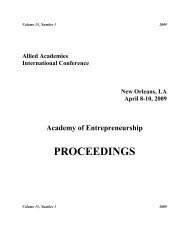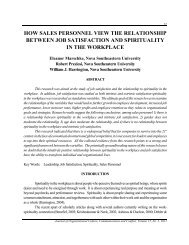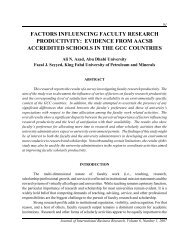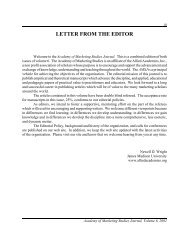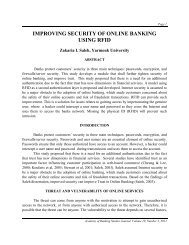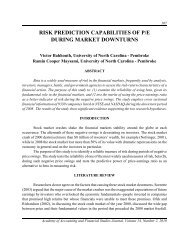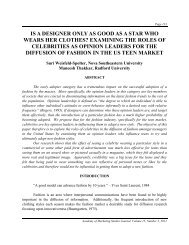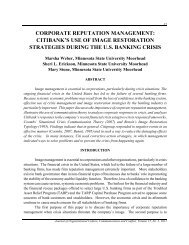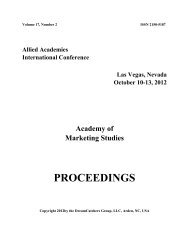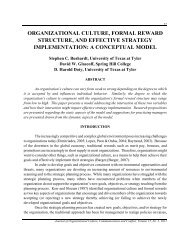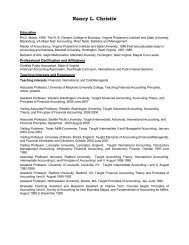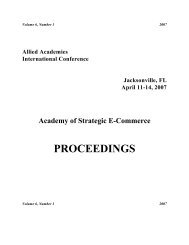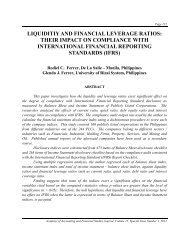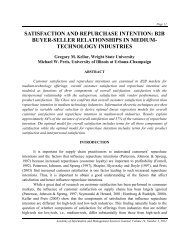AOCCC - Allied Academies
AOCCC - Allied Academies
AOCCC - Allied Academies
Create successful ePaper yourself
Turn your PDF publications into a flip-book with our unique Google optimized e-Paper software.
page 44<br />
<strong>Allied</strong> <strong>Academies</strong> International Conference<br />
indeed attempt to deal with the discrimination by actively doing something about it. Managers<br />
and HR practitioners should take notice of this. Employees are expending mental and physical<br />
efforts to overcome this devaluation. These efforts could most certainly be better used in helping<br />
achieve organizational goals, as opposed to attempting to achieve organizational equality.<br />
Managerial and Practical Implications<br />
This study and previous studies reveal negative career success related to weight<br />
discrimination (Register & Williams, 1990; Roehling, et al., 2008). Workplace weight<br />
discrimination’s effects far exceed just the employee though. It also impacts the company,<br />
which is further justification for organizations and their managers to focus on helping not<br />
hindering the career success of their employees. Moreover, as organizations craft human<br />
resource policy, this study illustrates that a renewed focus should be on the fair treatment of all<br />
employees regardless of personal characteristics. Seeing that the rate of weight discrimination<br />
has almost doubled in the last ten years (Andreyeva, et al., 2008), the personal characteristic,<br />
body size should be added to the EEO statement printed on many company documents, from<br />
employment applications, to websites, to annual reports.<br />
Limitations, Future Research, and Conclusion<br />
As with any research study, limitations are present. The sample in the study is a limitation.<br />
While a diverse sample was intended, the sample was overwhelmingly female (82.4%). The<br />
subjective measure of career success proved to be a limitation. Only marginal support of the<br />
relationship between weight discrimination and career success was found, although there is an<br />
abundance of support for an objective measure of career success in the literature. As in Diamond<br />
et. al. (2008) future weight discrimination research should use both the subjective and objective<br />
measures of career success (e.g. income, number of promotions, distance from top level<br />
management). Additionally, differences in race and gender, and other life outcomes of workplace<br />
weight discrimination should be examined in future research.<br />
This study extends research on workplace stigmatization based on body size by offering<br />
discussion of its effects on career success. As scholars (e.g. Brownell, Crandall, Hebl, King,<br />
Puhl, Roehling, Rothblum) have devoted considerable time and research effort to this literature<br />
stream, this study further confirms that there is still much work to be done.<br />
REFERENCES<br />
Andreyeva, T., Puhl, R. M., & Brownell, K. D. (2008). Changes in perceived weight discrimination among<br />
americans, 1995-1996 through 2004-2006. Obesity Research, 16, 1129-1134.<br />
Bolino, M. C., & Turnley, W. H. (2005). The personal costs of citizenship behavior: The relationship between<br />
employee conscientiousness and role overload, job stress, and work family conflict. Journal of Applied<br />
Psychology, 90, 740-748.<br />
Orlando, 2011<br />
Proceedings of the Academy of Organizational Culture, Communications and Conflict, V.16(1)



